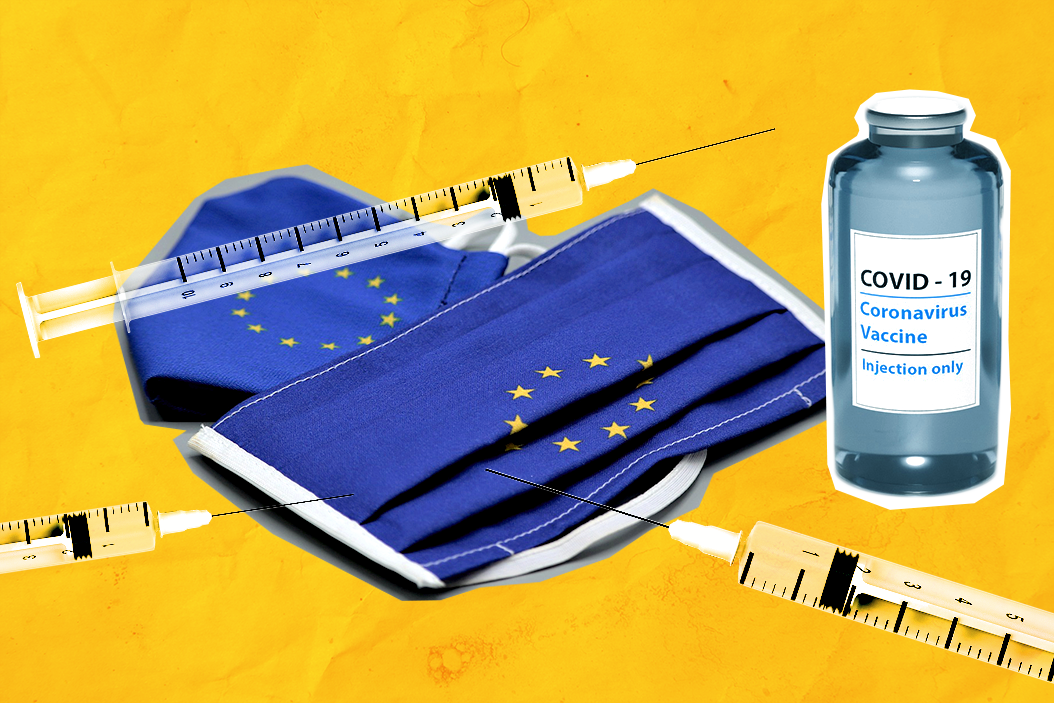"We're still not where we want to be," European Commission President Ursula von der Leyen said this week about the European Union's sluggish vaccine rollout. It was a sort of concession from the EU chief, who's been criticized for overseeing a bungled inoculation rollout in the world's largest trading bloc.
To date, around four percent of the bloc's population has been vaccinated, compared to 13 percent in the US, and 20 percent in the UK.
Why has the EU rollout been so slow, and what does this mean for Europe and its politics?
Stronger together? EU states are usually responsible for their own public health policies, but the 27-member bloc shifted course last summer by deciding to procure vaccines as a single bloc. While this approach prevents larger and richer countries (Germany, France) from buying up all the stock and leaving smaller and poorer ones (Bulgaria, Romania) behind, the process has been a bureaucratic and logistical nightmare.
For starters, before it could ink a deal with a pharma company, the Commission had to hold lengthy negotiations, and wait for individual EU countries to sign the contract separately. Hampered by political machinations, the back-and-forth took months, costing the bloc precious time.
The EU's vaccine procurement strategy also appears to have slowed things down. Focused on obtaining drugs at the lowest cost, Brussels — which signed a deal with AstraZeneca two months after the UK did — bargained with drug companies while other governments pursued a whatever-it takes strategy, buying up the jabs first.
When asked about the speedy vaccine rollout in Israel, for instance, Prime Minister Benjamin Netanyahu said, we "did not quibble about the price of vaccines." Of course, Israel only had to secure vaccines for 9 million people, compared to the EU's 450 million. Still, during a deadly pandemic, a 7-day negotiation delay can result in a large number of deaths.
Aversion to risk. The EU made clear from the start that it was not going to rush the vaccine regulatory approval process. While the US,Canada,Britain and others were willing to give speedy emergency authorizations for use — often bypassing traditional clinical trial protocols — the EU took an unhurried approach, authorizing the Pfizer vaccine on December 21, three weeks after the UK. This was further complicated by supply shortages, with pharma companies reneging on commitments made to the EU.
The Union also has other challenges to contend with. In France, home to a large anti-vaccine movement, some 60 percent of adults recently said they would not get a COVID jab, compromising France's bid to reach herd immunity. Compare that to the US, where 67 percent of residents now say they'll get vaccinated.
These factors complicate the EU's efforts to get back to normal anytime soon. It's no small feat that last summer the bloc passed a 750 billion euro coronavirus relief package, where for the first time, all EU countries agreed to share the financial burden of rescuing some members. (Compare that with the responses of EU governments to the sovereign debt crisis that followed the US global financial market meltdown and migrant crisis in 2015-2016.)
But those funds can only go so far in aiding Europe's economic recovery. Tourism-dependent economies (think Greece, Portugal, and Spain) need to reopen soon to avoid worsening economic crises, and that's not going to happen until most EU residents — 20 percent of whom are over the age of 65 — and visitors alike are protected from COVID-19.
Was this shortfall unavoidable considering the enormous task at hand?Mujtaba Rahman, Europe practice head at Eurasia Group, our parent company, says this outcome "definitely was not inevitable; more the result of several tactical missteps made by both the Commission and the member states." Rahman predicts "a reckoning" post-COVID "just as there was in the aftermath of the Greek debt crisis."
Who's filling the gap? Naturally, Russia and China are eager to help. Hungary, an EU member state often at odds with Brussels that has repeatedly criticized the bloc-wide procurement process, has bypassed Brussels by approving Russia's Sputnik V vaccine for use, and sealing a deal with Chinese-owned Sinopharm. Will other EU states follow suit?
The trade-off: The European Commission has prioritized European unity ahead of vaccine nationalism. This has clearly delayed the bloc's pandemic response. But how will voters in wealthy EU countries respond when they next go to the polls? Will they agree with Euroskeptic parties that EU unity was not worth the botched outcome? Only time will tell.
More For You
Behind every scam lies a story — and within every story, a critical lesson. Anatomy of a Scam, takes you inside the world of modern fraud — from investment schemes to impersonation and romance scams. You'll meet the investigators tracking down bad actors and learn about the innovative work being done across the payments ecosystem to protect consumers and businesses alike. Watch the first episode of Mastercard's five-part documentary, 'Anatomy of a Scam,' here.
Most Popular
Think you know what's going on around the world? Here's your chance to prove it.
